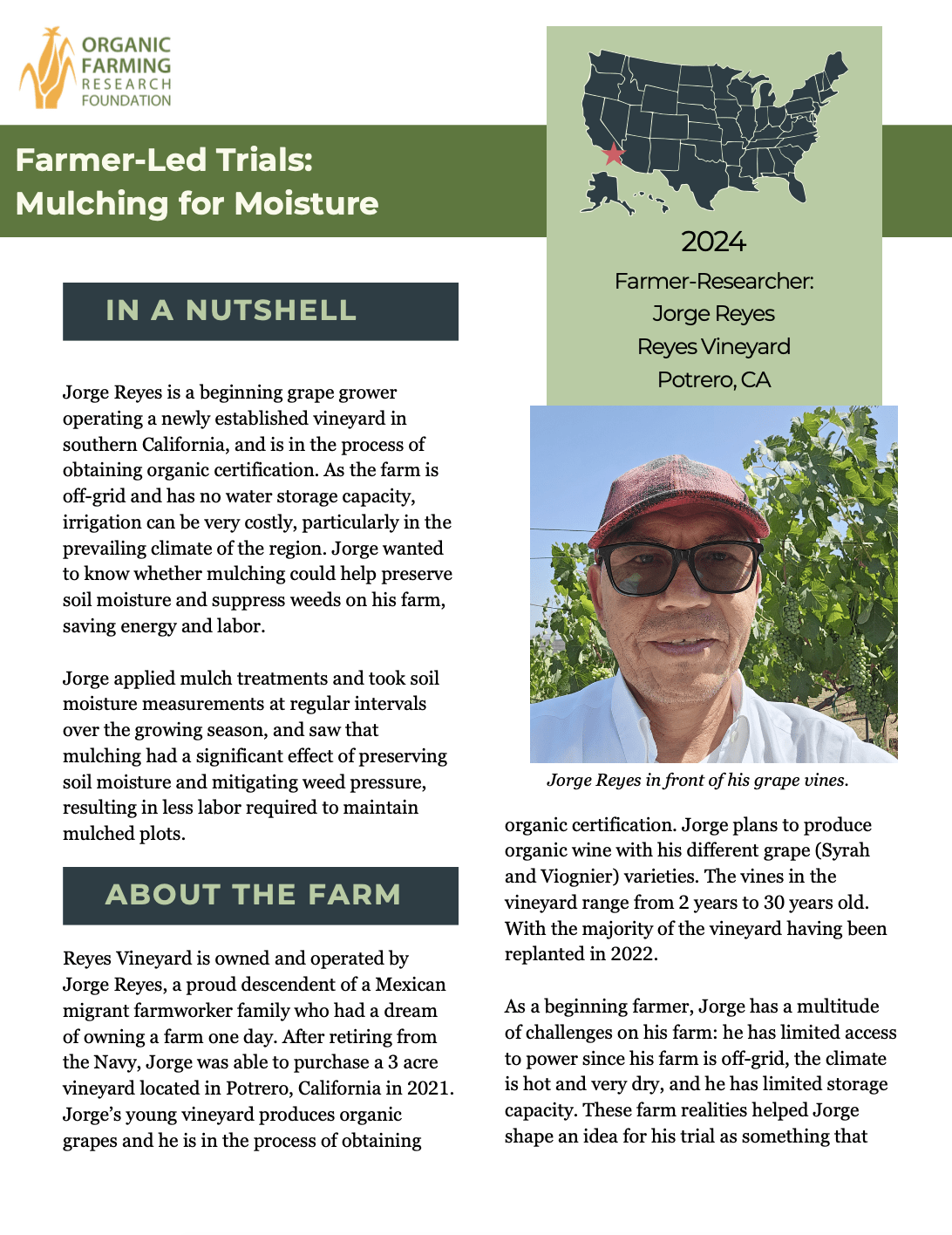Written by Jose Perez, OFRF’s Research & Education Engagement Coordinator
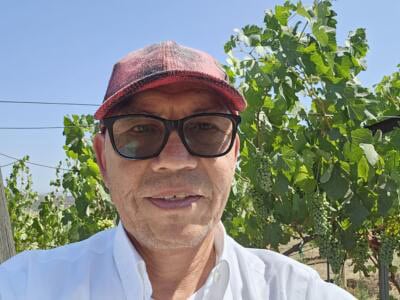
Image: Jorge Reyes in the vineyard.
Jorge proudly comes from a Mexican migrant farmworker family who had a dream of owning a farm one day. After retiring from the Navy, he was able to purchase a 3-acre vineyard located in Potrero, California. Jorge’s young vineyard produces organic grapes, and it is in the process of obtaining organic certification. Jorge plans to produce organic wine.
Finding the Right On-Farm Challenge to Focus On
Jorge was initially interested in conducting a farm trial to find solutions for suppressing gophers. These little creatures are a constant challenge at the vineyard because they burrow in the soil and chew on the roots, severely damaging or killing the vines. He was also interested in testing different practices to manage wasps during grape maturation and harvest. OFRF staff discussed with Jorge the difficulty of designing a farm trial based on these two challenges, given practical limitations, such as the size of the farm and the length of time needed.
The challenges on a young vineyard are not in short supply, so Jorge pivoted to focus on the use of mulch for soil moisture retention, weed management and grape quality. Improving soil moisture is critical to Jorge’s operation, as the irrigation depends on a solar-powered pump. The local climate conditions are generally very dry, with 9 to 11 inches of rain during the winter season. Wildfires are a frequent risk during the dry season, making soil moisture a critical factor and cost to Jorge’s operation.
On-Farm Trial Updates
With OFRF technical support, Jorge is now conducting a paired comparison where 10 grapevines with mulch will be compared with 10 vines with no mulch. Jorge applied 3 inches high of mulch around the vine (about a 4-foot area for each vine) in late May. He marked the trial area with stakes to identify each plant.
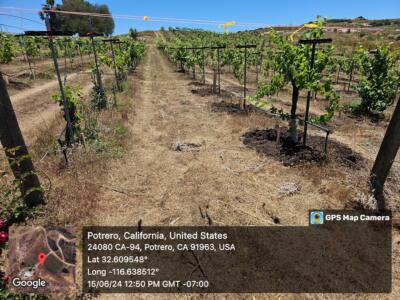 To compare the moisture levels of the two treatments, Jorge purchased a soil moisture sensor. To date, he has conducted two measurements, one in late June and one in mid-July. Based on those readings, Jorge already sees a clear winner: The soil around the mulched grapevines has consistently been showing good moisture levels, while the readings around the un-mulched plants show dry conditions. Jorge’s own observations confirm this: “The mulch is like a double win, the mulch holds the moisture for longer and it suppresses the weeds as well… There are also a lot of creatures and biological activity in the mulched areas, while just putting the soil probe into the un-mulched areas was a challenge, as the soil was hard,” Jorge said.
To compare the moisture levels of the two treatments, Jorge purchased a soil moisture sensor. To date, he has conducted two measurements, one in late June and one in mid-July. Based on those readings, Jorge already sees a clear winner: The soil around the mulched grapevines has consistently been showing good moisture levels, while the readings around the un-mulched plants show dry conditions. Jorge’s own observations confirm this: “The mulch is like a double win, the mulch holds the moisture for longer and it suppresses the weeds as well… There are also a lot of creatures and biological activity in the mulched areas, while just putting the soil probe into the un-mulched areas was a challenge, as the soil was hard,” Jorge said.
Image: Side-by-side trials of mulched and un-mulched grape vines.
Jorge has not cut back on irrigation, but after seeing the immediate effects of mulch, he is considering doing so, which would represent some energy and cost savings. In terms of weed suppression, the pictures Jorge took of the plants in late June are striking (see attached pictures). The mulch successfully suppressed weed growth and can represent some labor savings in the long term. Finally, Jorge is curious to know if the mulch will affect the grapes’ sugar content levels. He is planning to conduct these measurements at harvest through a Brix meter.
Below images: un-mulched grape vines on left and mulched grape vines on right.
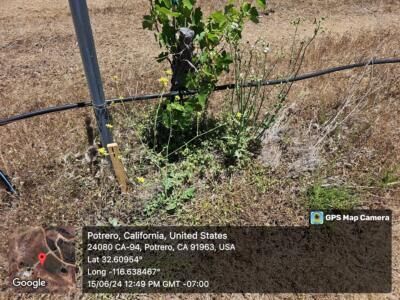
“The mulch provides a beneficial ecosystem that is thriving with beneficial organisms like rollie-pollies and pinchers which help increase the soil health. I plan to double my effort to increase the mulch application. This will lead to water conservation, increase soil health, increase my crop yield and reduce my labor requirement. This is a win-win for the environment and myself.” – Jorge Reyes
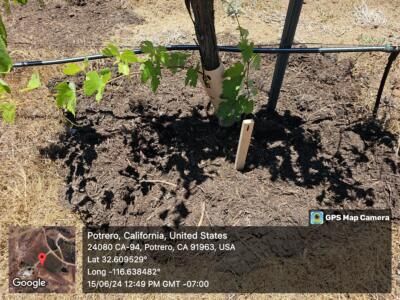
Research Results
Jorge Reyes’ farmer-led trial examined the effects of mulching on soil moisture retention, weed suppression, and labor reduction in his organic vineyard. Over the course of the growing season, Jorge applied a 3-5” layer of organic mulch around selected grapevines and monitored soil moisture levels, weed presence, and grape sugar content (Brix levels).
Key Findings:
- Increased Soil Moisture: In both Syrah and Viognier grape varieties, mulched plots consistently retained higher moisture levels compared to unmulched plots. This effect was statistically significant in Syrah at all sampling dates and in Viognier at two out of three sampling dates.
- Reduced Weed Pressure & Labor Needs: Jorge observed fewer weeds in the mulched plots, leading to reduced labor for trimming and vineyard maintenance.
- Potential Impact on Grape Quality: While not formally evaluated, preliminary Brix readings suggest mulched vines had slightly higher sugar content (22 vs. 20) than unmulched vines, indicating potential effects on fruit ripening.
Encouraged by these results, Jorge plans to integrate mulching as a long-term vineyard management strategy. He is particularly interested in further exploring its impact on grape yield, soil biodiversity, and irrigation efficiency in future seasons.
For full details on the study’s methodology and results, read the final report.
At OFRF we are excited to partner with Jorge in his quest to produce a high quality organic wine, while sharing with other small scale grapevine producers the effects of mulching.
“I am 100% sold on organic, protecting our environment and learning to cohabitate with nature. Organic should be the only option, we need to consume healthy food that is not going to poison us.” – Jorge Reyes
This story is part of a series profiling farmers who are taking part in OFRF’s Farmer-Led Trials (FLT) program. Farmers receive technical support from OFRF to address their challenges through structured on-farm trials. To learn more about OFRF’s Farmer-Led Trials Program, visit our website page at https://ofrf.org/research/farmer-led-research-trials/



